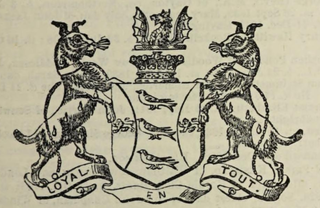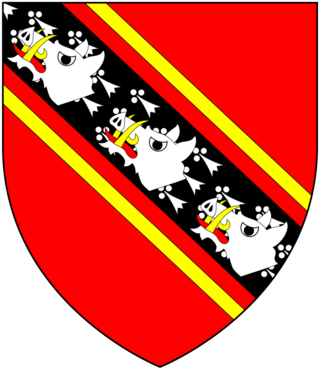Related Research Articles

Emperor Ōgimachi was the 106th Emperor of Japan, according to the traditional order of succession. He reigned from November 17, 1557, to his abdication on December 17, 1586, corresponding to the transition between the Sengoku period and the Azuchi–Momoyama period. His personal name was Michihito (方仁).
Jean Hotman, Marquis de Villiers-St-Paul was a French diplomat. Although he came from a Calvinist family, who had been exiled during the French Wars of Religion, Jean, through cultivating connections with Henry IV eventually was restored to a portion of his patrimony.

Sir Valentine Browne, of Croft, Lincolnshire, was auditor, treasurer and victualler of Berwick-upon-Tweed. He acquired large estates in Ireland during the Plantation of Munster, in particular the seignory of Molahiffe. He lived at Ross Castle near Killarney, County Kerry. He was MP in three English and one Irish parliaments.
Sir Nathaniel Bacon, of Stiffkey in Norfolk, was an English lawyer and Member of Parliament (MP).

Robert Cooke was an English Officer of Arms during the reign of Elizabeth I, who rose swiftly through the ranks of the College of Arms to Clarenceux King of Arms, serving in that office from 1567 until his death in 1592–3.
Bartholomew Clerke (1537?–1590) was an English jurist, politician and diplomat. He became Dean of the Arches and a contemporary of Edward de Vere, 17th Earl of Oxford.
William Fleetwood was an English lawyer and politician. He was Member of Parliament for Marlborough in 1558, Lancaster in 1559 and 1567, and for the City of London several times between 1572 and 1592, but his most significant position was as Recorder of London from 1571 to 1591. A lawyer of the Middle Temple, he was a Queen's Serjeant in 1592.

Peter Edgcumbe of Mount Edgcumbe and of Cotehele in the parish of Calstock, both in Cornwall, was an English Member of Parliament.
Sir Robert Wroth was an English politician.
Edward Flowerdew, was an English judge and MP.
Sir Henry Gates, of Seamer, Yorkshire; Kilburn, Middlesex; Kew, Surrey and Havering, Essex, was an English courtier and politician.
John Hammond (1542–1589) was an English civil lawyer and politician.
Sir Thomas West was an English politician.
Sir Thomas Wilkes was an English civil servant and diplomat during the reign of Elizabeth I of England. He served as Clerk of the Privy Council, Member of Parliament for Downton and Southampton, and English member of the Council of State of the Netherlands, and on many diplomatic missions for the English government.
John North, of Cambridgeshire, was an English politician.
The Rottweil Witch Trials were a series of witch trials in the town of Rottweil in Swabia, a town in the Margraviate of Baden, a Holy Roman Empire city in what is now Germany, between 1546 and 1661. 234 women and 53 men were accused of witchcraft. Out of 287 accused, only 21 were found innocent, while the other 266 were killed. The majority of the victims were burned to death, although some were beheaded. 400 years later, the town pardoned the accused posthumously. A commemorative plaque was placed on the tower in the city, which was formerly a prison, to serve as a memorial for the victims of the trials.
References
- ↑ Alumni Oxonienses 1500-1714, Dabbe-Dirkin
- ↑ "Dale, Valentine (DL562V)". A Cambridge Alumni Database. University of Cambridge.